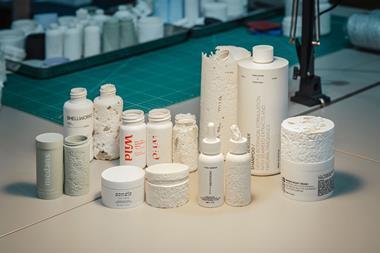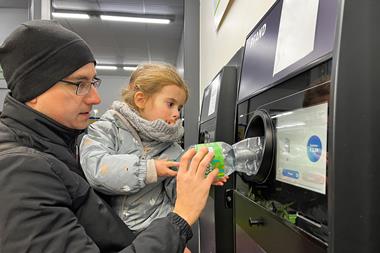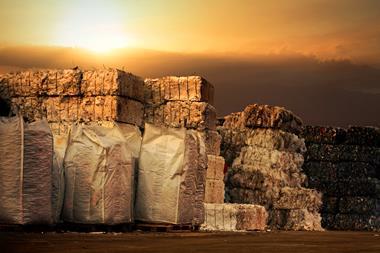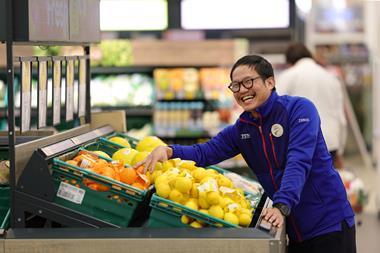Low carb finally shed its fad diet connotations this week as retailers vied for the moral highground in the battle against climate change.
First Marks & Spencer and then Tesco launched dramatic eco-plans covering all areas of their business: from air-freight labelling schemes to energy efficiency initiatives in stores; from recycling and waste-reduction measures to promotions on more environmentally friendly products.
On the face of it, both plans look far-reaching and innovative: M&S promises to become carbon-neutral, while Tesco's "green revolution" includes a carbon footprint of every product it sells and of every business across all the countries in which it operates (see boxout, right).
While both chains will be praised for these new initiatives, however, there is no shortage of carping and quibbling from the sidelines.
Details of Tesco's plans were provided to The Grocer on an embargoed basis, so we were unable to gauge industry reaction prior to publication.
However, some industry experts warn 'green spin' could encourage consumers to become cynical about environmental measures, seeing the supermarkets as merely trying to outdo each other.
Tesco's plan to set up a Sustainable Consumption Institute, which will work on developing a commonly understood carbon footprint measure on every product it sells, is a fine initiative, for example.
However there's little sign of collaboration with other retailers - a commendable move initiated by Asda boss Andy Bond when he called on the industry to work together on environmental issues at an IGD conference organised by him in November. And Tesco's announcement will upstage Asda's announcement of an action plan on 2 February.
A spokesman for Tesco said: "We're setting the standard here and sincerely hope others will follow." In his speech to the Forum for the Future conference on Thursday, Sir Terry Leahy added: "I am pleased that M&S has also made this decision [on labelling of air-freighted products]."
Marks & Spencer's plans do come in for criticism in other regards, however. Mandy Stoker, director of consultancy E4 Environment, says M&S has included issues in its announcement already covered by law. "There is already legislation in place about reducing and recycling packaging that comes under producer responsibility, but the public wouldn't be aware of that."
And she adds that the M&S pledge to become carbon-neutral is problematic. "A few years ago people talked about creating zero waste in the same way they now talk about being carbon-neutral, but they don't any more because it was simply too hard to do. I have a feeling the term carbon-neutral will go the same way."
Ian Bowles, environment manager at Asda, is also critical of M&S's plans: "Carbon-neutral? What a load of old rot. The idea of becoming carbon-neutral through offsetting carbon emissions is not the same as reducing energy consumption. It's like the Chelsea mums planting a few trees so they can drive home in their SUVs with a clear conscience."
Bowles also pulls up M&S on its plans to move into compostable packaging, saying it could actually be harmful to the environment. Only 8% of local authorities have composting facilities, he says, so much of the packaging would still go straight into landfill to release yet more harmful methane gas.
"It makes great headlines, but no environmental sense," he says.
Other retailers have been quick to point out initiatives they have pioneered. Sainsbury's claims a first in wind turbines in 2001 while the Co-operative Group can trace its environmental credentials back even further, to the 1990s when caring for the environment was the preserve of tree-huggers.
The Co-op could be forgiven for being miffed at the late but triumphal arrival of Tesco et al. However, its head of ethical and sustainability Paul Monaghan has nothing but praise.
"Any announcements of this kind are brilliant for the environment. M&S and Tesco are taking this seriously. We have seen a turning point for climate change. Hurricane Katrina, the Stern report and the realisation that ice-caps are melting at a much faster rate has concentrated everyone's minds."
Now business is firmly on board, Monaghan says the challenge will be to convince consumers to re-evaluate their lifestyles. "It's now about bringing consumers on board."n
First Marks & Spencer and then Tesco launched dramatic eco-plans covering all areas of their business: from air-freight labelling schemes to energy efficiency initiatives in stores; from recycling and waste-reduction measures to promotions on more environmentally friendly products.
On the face of it, both plans look far-reaching and innovative: M&S promises to become carbon-neutral, while Tesco's "green revolution" includes a carbon footprint of every product it sells and of every business across all the countries in which it operates (see boxout, right).
While both chains will be praised for these new initiatives, however, there is no shortage of carping and quibbling from the sidelines.
Details of Tesco's plans were provided to The Grocer on an embargoed basis, so we were unable to gauge industry reaction prior to publication.
However, some industry experts warn 'green spin' could encourage consumers to become cynical about environmental measures, seeing the supermarkets as merely trying to outdo each other.
Tesco's plan to set up a Sustainable Consumption Institute, which will work on developing a commonly understood carbon footprint measure on every product it sells, is a fine initiative, for example.
However there's little sign of collaboration with other retailers - a commendable move initiated by Asda boss Andy Bond when he called on the industry to work together on environmental issues at an IGD conference organised by him in November. And Tesco's announcement will upstage Asda's announcement of an action plan on 2 February.
A spokesman for Tesco said: "We're setting the standard here and sincerely hope others will follow." In his speech to the Forum for the Future conference on Thursday, Sir Terry Leahy added: "I am pleased that M&S has also made this decision [on labelling of air-freighted products]."
Marks & Spencer's plans do come in for criticism in other regards, however. Mandy Stoker, director of consultancy E4 Environment, says M&S has included issues in its announcement already covered by law. "There is already legislation in place about reducing and recycling packaging that comes under producer responsibility, but the public wouldn't be aware of that."
And she adds that the M&S pledge to become carbon-neutral is problematic. "A few years ago people talked about creating zero waste in the same way they now talk about being carbon-neutral, but they don't any more because it was simply too hard to do. I have a feeling the term carbon-neutral will go the same way."
Ian Bowles, environment manager at Asda, is also critical of M&S's plans: "Carbon-neutral? What a load of old rot. The idea of becoming carbon-neutral through offsetting carbon emissions is not the same as reducing energy consumption. It's like the Chelsea mums planting a few trees so they can drive home in their SUVs with a clear conscience."
Bowles also pulls up M&S on its plans to move into compostable packaging, saying it could actually be harmful to the environment. Only 8% of local authorities have composting facilities, he says, so much of the packaging would still go straight into landfill to release yet more harmful methane gas.
"It makes great headlines, but no environmental sense," he says.
Other retailers have been quick to point out initiatives they have pioneered. Sainsbury's claims a first in wind turbines in 2001 while the Co-operative Group can trace its environmental credentials back even further, to the 1990s when caring for the environment was the preserve of tree-huggers.
The Co-op could be forgiven for being miffed at the late but triumphal arrival of Tesco et al. However, its head of ethical and sustainability Paul Monaghan has nothing but praise.
"Any announcements of this kind are brilliant for the environment. M&S and Tesco are taking this seriously. We have seen a turning point for climate change. Hurricane Katrina, the Stern report and the realisation that ice-caps are melting at a much faster rate has concentrated everyone's minds."
Now business is firmly on board, Monaghan says the challenge will be to convince consumers to re-evaluate their lifestyles. "It's now about bringing consumers on board."n



















No comments yet